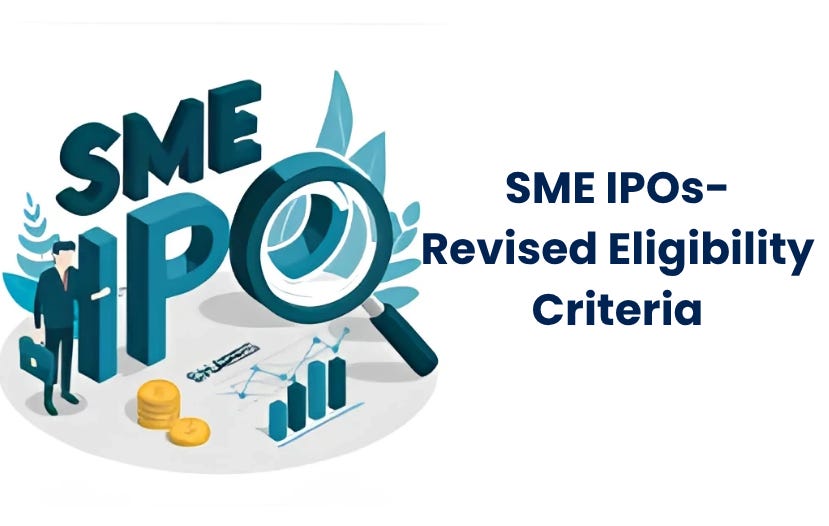Confused by the new SME IPO criteria?
This guide explains SEBI's changes to the eligibility criteria for SME IPOs.
Small and Medium Enterprises (SMEs) are the backbone of the Indian economy, driving innovation, employment, and economic growth. They are characterized by agility and dynamism, often relying on private funding in their initial stages. As SMEs mature and their capital requirements expand, they can access the public markets through an Initial Public Offering (IPO). Recent regulatory shifts, spearheaded by the Securities and Exchange Board of India (SEBI) have ushered in a new era of stringent eligibility criteria for SMEs seeking to list on the NSE Emerge platform. This blog post aims to dissect these pivotal regulatory amendments, elucidating the revised framework that now governs SME IPOs.
SEBI's New Regulations
On December 18, 2024, SEBI introduced pivotal amendments to the SEBI (ICDR) Regulations, 2018, and SEBI (LODR) Regulations, 2015. The following key amendments form the core of this strengthened framework:
Limiting Promoter Offer for Sale (OFS): Promoters are now restricted from offering more than 20% of the total issue size through OFS. They are also limited to selling no more than 50% of their total holdings in the IPO.
Mandatory Profitability Requirement: SMEs must demonstrate an operating profit of at least Rs 1 crore in any two of the three preceding financial years.
Restriction on Loan Repayment: The utilization of IPO proceeds to repay loans extended by promoters or promoter groups is strictly prohibited.
Cap on General Corporate Purposes: The allocation of funds for general corporate purposes is limited to 15% of the total amount raised or Rs 10 crore, whichever is lower
NSE eMerge's Stricter Eligibility Criteria
In response to SEBI's revised regulations, the National Stock Exchange (NSE) has swiftly implemented stricter eligibility criteria for SMEs seeking to list on its dedicated platform, NSE Emerge. Through a circular issued on December 20, 2024, NSE mandated that all SMEs aiming to access the capital markets through its platform must now comply with the aforementioned amendments. This decisive action underscores NSE's commitment to upholding the integrity of the SME IPO market and ensuring adherence to the enhanced regulatory framework. The new criteria are applicable to all Draft Red Herring Prospectuses (DRHPs) filed on or after December 19, 2024, signaling a definitive shift towards a more stringent and regulated SME IPO landscape.
Implications of the Revised Criteria
The recent revisions to the SME IPO eligibility criteria are set to instigate significant changes within the sector, influencing both the companies seeking to list and the investors participating in these offerings.
Increased Selectivity in Listings: The stricter profitability requirements and limitations on promoter OFS will lead to a more discerning selection of companies qualifying for listing.
Enhanced Investor Confidence: The heightened scrutiny signals a commitment to quality and transparency, bolstering investor confidence in the SME IPO market.
Emphasis on Financial Discipline: SMEs will need to demonstrate consistent profitability and sound financial management, fostering a more robust and resilient ecosystem.
Productive Use of IPO Proceeds: The restriction on using IPO proceeds to repay promoter loans ensures capital is directed towards genuine business expansion.
Improved Transparency and Accountability: The cap on general corporate purpose allocations minimizes fund diversion, promoting a more transparent and accountable market.
Challenges for Some SMEs: Some SMEs may face difficulties meeting the new criteria, potentially delaying their access to public markets.
Long-Term Market Stability: These measures are anticipated to create a more stable and reliable SME IPO market, benefiting both issuers and investors.
Conclusion
The recent amendments to the SME IPO framework, as mandated by SEBI and implemented by NSE Emerge, represent a pivotal step towards enhancing the integrity and sustainability of India's SME capital markets. Regulators have aimed to foster a more investor-friendly environment by imposing stricter eligibility criteria. These changes underscore a commitment to ensuring that SMEs accessing public capital are fundamentally sound and capable of delivering long-term value.
Are question marks still ringing in your head? Download the JJ Tax app today and ask JIA (our expert-powered chat assistant) any queries you may have regarding the latest SME IPO criteria.
Visit www.jjfintax.com to know more.




